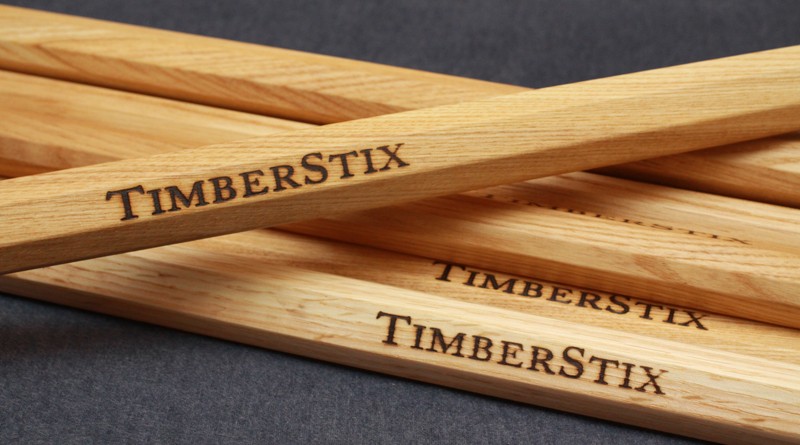Sunappee, NH teen Handcrafts Lacrosse Stick Business
 SUNAPEE, N.H. — Cortland Begor grew up with what he calls a “business mindset,” selling lemonade and managing an online bookstore on eBay. He says his entrepreneurship comes from his family.
SUNAPEE, N.H. — Cortland Begor grew up with what he calls a “business mindset,” selling lemonade and managing an online bookstore on eBay. He says his entrepreneurship comes from his family.
“I always grew up with that kind of discussion around the dining room table,” he says. “As I grew older, it was something I aspired to and wanted to follow, but in my own way.”
That way has turned into a business manufacturing wooden lacrosse sticks.
Begor, 19, has been making ash lacrosse sticks in his family’s woodworking shop since he was in junior high school, and playing the sport since he can remember. Today, he’s the owner and sole employee of TimberStix, a line of handmade wooden lacrosse sticks that he says are the next evolution in stick design.
As a high school senior, playing attack on Proctor (NH) Academy’s varsity squad, he’s earned recognition not only for his performance on the field, but for the lacrosse sticks he manufactures and sells.
Growing up, he and his brothers made their own lacrosse sticks in the family woodshop of their second home in Sunapee, N.H. Once they perfected their design, they started to use the handcrafted sticks in games. When friends noticed the sticks and wanted to use them as well, Begor saw an opportunity.
Last spring, he increased production and packed a duffle bag with 50 sticks and brought them to a training camp where recruiters from colleges look for promising players. He sold them for $37.99 each, and left at the end of the week having turned a profit as well as gained attention from the recruiters.
“People couldn’t get enough of them,” he says.
When he first started out manufacturing the sticks in earnest, he had straightforward goals: “I wanted to create the best possible lacrosse shaft, something that was flexible and tougher than the generic metal and composite lacrosse shafts. Being a woodworker, I knew I could make a high-performance wooden shaft just the way I wanted it and with my own unique branding. That’s just what I did.”
Today, Begor still keeps the handcrafted process during manufacturing, but he’s stepped up production in the woodshops at home and high school. When he was just making sticks for himself and a handful of friends, crafting a single stick took 15 minutes. Begor now produces larger batches of over 100 beginning by selecting ash from a local lumberyard. He mills and sands every piece to regulation length and width before branding them with a hand-forged brand and applying three coats of Danish oil with a light sanding between coats.
The result, according to Begor, is a more durable stick with more torque. Composite or aluminum sticks have to be replaced almost every year, he said. By comparison, he’s played on Proctor Academy’s lacrosse team using one of his handmade sticks for three years. During that time he’s only broken one.
“I’ve worked tirelessly to create a superior product,” he said in his business outline. “After testing various local woods, I selected ash, which is a wood that routinely lends its strength and lightness to furniture and baseball bats. Ash is also local to New Hampshire and our ash is harvested locally and processed sustainably.”
The wooden shaft also has advantages from the players’ perspective, Begor says. “A TimberStix shaft is light, versatile and provides a menacing blow — all characteristics of the highest performance shafts on the market. While many think of a wooden lacrosse shaft as purely a novelty item, it is truly one of the highest performance shafts on the market.”
More to learn
Being young, Begor recognizes he has a lot to learn in the world of business. Fortunately, he says, he gets plenty of support from the faculty at his high school.
“One of the nice things about being in a high school is I can go to each person who is good in a certain subject,” he says. “If it’s marketing or outsourcing, these are all things that I need to learn.”
As a way to master the basics of entrepreneurship, Begor meets twice a week with the academy’s CFO as part of an independent study Begor designed himself. It’s a one-on-one course that covers everything from marketing strategy to production and distribution.
“It’s my favorite block out of the day,” he says. “I try and finish as much homework as possible in my classes before I go home and do TimberStix homework,”
Begor says he puts two hours of work into his company every day in addition to juggling a full schedule of classes and, during winter, training for the school’s ski team.
“There’s a lot that I want to get done each day that I have to put off for the next day,” he says. “But I enjoy it.”
His cell phone routinely rings with calls from manufacturers, product ambassadors and clients while he’s in AP statistics or on the ski slope training for F.I.S super-g races.
Many people, he says, are surprised that a high school student is filling and shipping their orders.
“A lot of the people that call don’t even know I’m in high school,” he says. “Most people are really excited about a high school student starting a company and trying to make it big,” he says. “Because that’s ultimately what I’m trying to do. I’m not trying to be a stagnant company.”
Begor also calls industry professionals and the heads of companies for their advice.
This summer, he’ll be going back to the recruiting camps, but this time as a full-time vendor. When he heads to college in the fall, when he hopes to play college lacrosse and major in business, he intends to outsource production to small woodshops in Vermont or New Hampshire while monitoring production from college. The goal, he says, is to increase supply and push into retail. With online and personal sales, he’s sold about 500 sticks and donated a portion of his profits to One Percent for the Planet, a nonprofit that connects funds with environmental preservation efforts.
For a high school student, Begor says, he’s off to a good start. Even though he manages all phases of production and sales, he still catches himself saying “we” when he talks about plans for TimberStix — as if he already has his own team and one day it’ll be a bigger business, but that will have to wait for another day.
“There’s definitely a lot of knowledge that’s aiding me in how I manage and run the company, but it’s just me — doing the phone calls, the production, packaging and shipping.”

